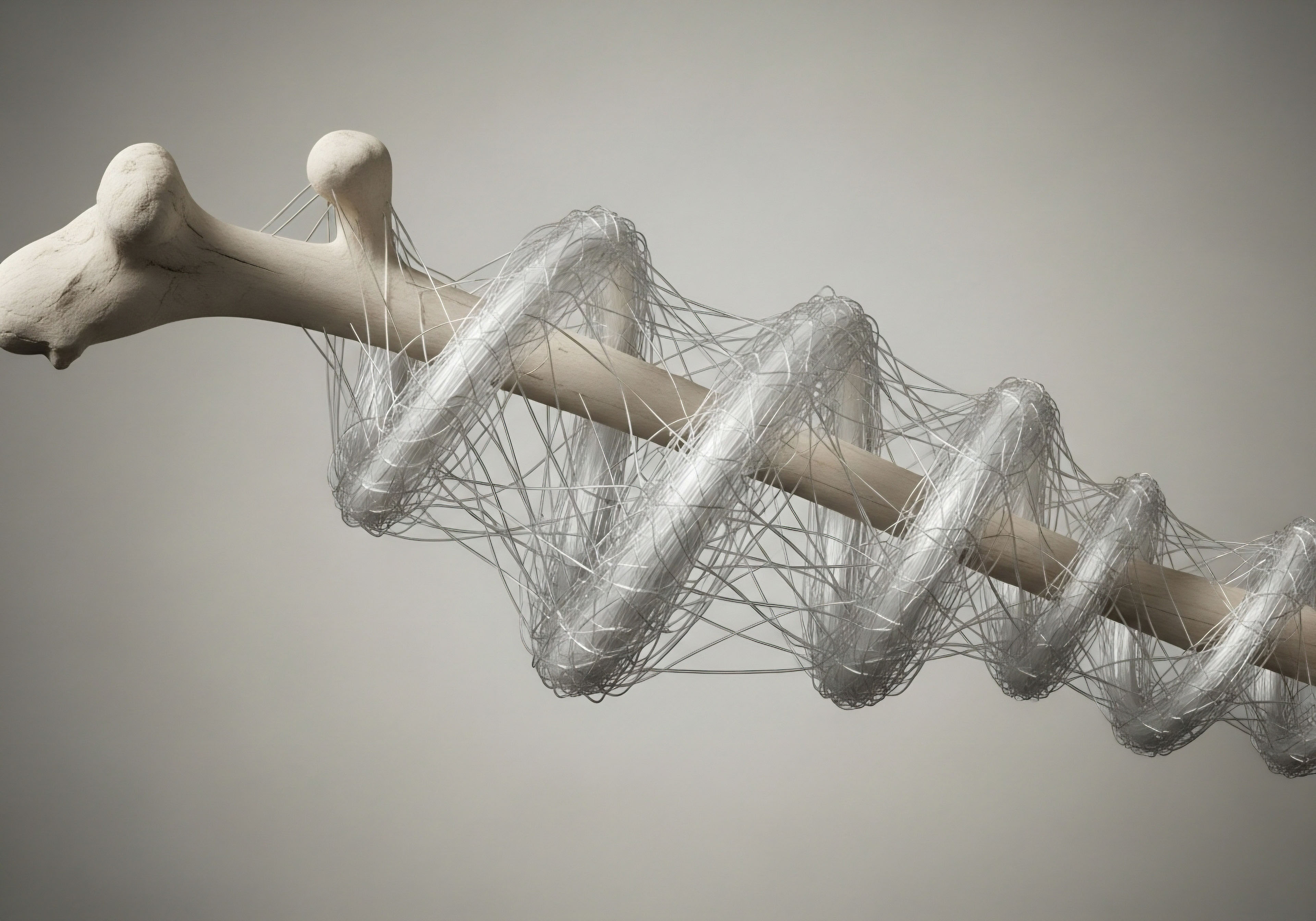

The Biological Blueprint of Unwavering Energy
The human body operates as an intricate biological engine, a sophisticated system where hormonal signals dictate the pace, power, and resilience of our existence. These potent chemical messengers, secreted by endocrine glands, are not mere regulators; they are the architects of our vitality, profoundly influencing everything from cognitive acuity and emotional equilibrium to metabolic efficiency and physical prowess.
To master your hormones is to grasp the fundamental controls of your energy reserves, unlocking a level of sustained performance and well-being that transcends the ordinary. This is the foundational understanding that underpins true biological optimization.

The Master Regulators of Your Daily Drive
At the core of sustained energy and peak function lies a delicate interplay of hormones, each with distinct roles that converge to power your day. Understanding these players is the first step in reclaiming your biological prime.

Testosterone ∞ The Catalyst for Drive and Power
Often associated with masculinity, testosterone is a vital hormone for both men and women, underpinning energy levels, muscle mass, bone density, cognitive function, and a robust sense of drive. Declining levels are a direct pathway to fatigue, diminished motivation, and reduced physical capacity. Its presence signals the body to build, perform, and maintain its most potent physical and mental states.

Estrogen ∞ The Modulator of Mood and Cognition
Estrogen plays a critical role in regulating mood, cognitive processes, and energy metabolism. In women, its fluctuations significantly impact energy levels, mental clarity, and emotional stability. In men, it contributes to mood regulation and cardiovascular health. Balanced estrogen is key to a smooth, energetic physiological operation.

Progesterone ∞ The Anchor of Calm and Recovery
While often viewed through the lens of reproductive health, progesterone is essential for sleep quality and stress resilience. Adequate progesterone levels promote a sense of calm, facilitate restorative sleep, and help modulate the excitatory effects of other hormones, creating an environment conducive to recovery and sustained energy.

Thyroid Hormones ∞ The Engine’s Thermostat
Thyroid hormones, primarily thyroxine (T4) and triiodothyronine (T3), are the master regulators of your metabolic rate. They dictate how efficiently your cells convert nutrients into energy. Suboptimal thyroid function is a direct cause of pervasive fatigue, sluggishness, and a general feeling of being ‘slowed down.’

Cortisol ∞ The Double-Edged Sword of Energy Mobilization
Cortisol, the body’s primary stress hormone, is essential for acute energy mobilization, helping you respond to immediate challenges. However, chronic elevation due to persistent stress disrupts sleep, impairs cognitive function, promotes fat storage, and ultimately leads to adrenal fatigue and profound exhaustion. Its balance is paramount for sustained vitality.

DHEA ∞ The Precursor to Youthful Vitality
Dehydroepiandrosterone (DHEA) serves as a precursor to other vital hormones, including testosterone and estrogen. It influences mood, immune function, and energy levels. As DHEA levels naturally decline with age, its supplementation or optimization can support a more youthful, energetic state.

Growth Hormone ∞ The Master of Repair and Rejuvenation
Growth hormone (GH) is critical for tissue repair, muscle growth, bone density, and metabolic regulation. Pulsatile GH release, primarily during deep sleep, is essential for recovery, body composition, and maintaining cellular integrity, all contributing to a feeling of robust, youthful energy.

Insulin ∞ The Gatekeeper of Energy Availability
Insulin’s primary role is regulating blood glucose, ensuring cells have access to energy. However, chronic insulin resistance, often driven by poor dietary habits, leads to energy crashes, stubborn fat accumulation, and significantly impairs overall metabolic health, directly impacting sustained energy.
Age-related hormonal decline is not an inevitable fate but a biological signal indicating systems that require precise recalibration for optimal function.
The synergistic action of these hormones dictates your daily capacity. When they operate in harmony, you experience consistent energy, sharp focus, and emotional resilience. When they falter, fatigue, brain fog, and diminished drive become the norm. Mastering your hormones is the strategic approach to ensuring your biological engine runs at its absolute peak.


Engineering Your Physiological Powerhouse
Achieving unrivaled energy through hormonal mastery is an engineering challenge. It requires a data-driven, systematic approach that begins with precise diagnostics and extends through targeted lifestyle interventions and, when indicated, advanced therapeutic strategies. This is not about guesswork; it is about applying scientific principles to optimize your unique biological architecture.

Precision Diagnostics ∞ Reading the Biological Code
The foundation of any successful optimization protocol is accurate assessment. Understanding your current hormonal landscape requires comprehensive, clinically validated testing.

Comprehensive Hormone Panels
A thorough assessment goes beyond basic tests. It involves evaluating total and free levels of key hormones like testosterone, estrogen, progesterone, DHEA-S, and SHBG (Sex Hormone-Binding Globulin). Understanding the ratios and binding proteins provides critical context.

Diurnal Rhythm and Biomarker Analysis
Hormones fluctuate throughout the day and night. Testing at specific times, such as morning cortisol and testosterone, captures these critical diurnal rhythms. Advanced markers like LH, FSH, prolactin, and thyroid panel components (TSH, Free T3, Free T4, antibodies) are essential for a complete picture of endocrine function. The interpretation of these biomarkers must be clinical, not generic, accounting for individual variability and symptom presentation.

Metabolic and Cellular Health Markers
Hormonal health is inextricably linked to metabolic status. Evaluating markers such as HbA1c, fasting glucose, lipid profiles, and inflammatory markers (e.g. hs-CRP) provides insight into insulin sensitivity and overall metabolic efficiency, which directly impacts energy production and hormonal balance.

Lifestyle Pillars ∞ The Unseen Foundation
Before considering external interventions, optimizing fundamental lifestyle factors is non-negotiable. These pillars create the ideal environment for your endocrine system to function optimally.

Sleep Optimization ∞ The Nightly Hormonal Reset
Deep, restorative sleep is when your body performs critical hormonal housekeeping. Growth hormone is released, cortisol levels naturally decline, and pathways for testosterone production are primed. Aim for 7-9 hours of quality sleep, maintaining a consistent schedule, optimizing your sleep environment (dark, cool, quiet), and minimizing blue light exposure before bed.

Nutrient-Dense Fuel ∞ Building Blocks for Hormones
Your diet provides the raw materials for hormone synthesis and function. A diet rich in high-quality proteins, healthy fats (avocado, nuts, seeds, olive oil), and complex carbohydrates supports sustained energy and hormonal production. Micronutrients like Zinc, Magnesium, Selenium, and Vitamin D are cofactors in numerous endocrine pathways. Reducing inflammatory foods, refined sugars, and excessive processed items is crucial for metabolic and hormonal health.

Strategic Movement ∞ Activating Your Biological Systems
Exercise is a powerful hormonal modulator. Resistance training stimulates muscle protein synthesis and boosts testosterone and growth hormone. High-Intensity Interval Training (HIIT) enhances metabolic flexibility and insulin sensitivity. Consistent aerobic exercise supports cardiovascular health and can help regulate cortisol. The key is a balanced approach that challenges the body without inducing chronic overtraining.

Stress Resilience ∞ Taming the Cortisol Beast
Chronic stress elevates cortisol, which can disrupt sleep, suppress reproductive hormones, and lead to energy depletion. Implementing stress-management techniques such as mindfulness meditation, deep breathing exercises, spending time in nature, or engaging in activities that promote relaxation is vital for hormonal balance and sustained energy.

Advanced Interventions ∞ Precision Tuning for Peak Performance
For individuals who have optimized lifestyle factors and still present with significant hormonal imbalances or suboptimal performance, advanced interventions can provide targeted solutions. These are applied with scientific precision, guided by diagnostics and clinical expertise.

Hormone Replacement Therapy (HRT) ∞ Restoring the Natural Balance
HRT is a cornerstone for addressing age-related or pathology-induced hormone deficiencies. It is not about supra-physiological levels but restoring levels to a healthy, functional baseline.
- Testosterone Replacement Therapy (TRT): For men with clinically diagnosed hypogonadism, TRT can dramatically improve energy, mood, libido, muscle mass, and cognitive function. Protocols are individualized based on ester choice (e.g. Testosterone Cypionate, Enanthate), dosage, and frequency of administration (e.g. injections, transdermal gels, patches) to mimic natural physiological patterns and minimize side effects.
- Estrogen and Progesterone Therapy: For women, optimizing estrogen and progesterone levels can alleviate menopausal symptoms, improve mood, cognitive function, bone density, and cardiovascular health, directly impacting energy and vitality. Therapy is tailored based on symptom presentation and individual risk factors.

Peptide Therapy ∞ Signaling for Cellular Regeneration
Peptides are short chains of amino acids that act as signaling molecules within the body, influencing a vast array of biological processes. When applied therapeutically, they can support hormonal balance and enhance cellular function.
- Growth Hormone Secretagogues (GHS): Peptides like Sermorelin and CJC-1295 (often combined with Ipamorelin or GHRP-6/2) stimulate the pituitary gland to release more Growth Hormone (GH) and Insulin-like Growth Factor 1 (IGF-1). This supports muscle repair, fat metabolism, cellular regeneration, and improved energy levels, particularly beneficial for recovery and anti-aging.
- Other Peptides: Research continues into peptides that support tissue repair (e.g. BPC-157) and metabolic function, offering further avenues for biological optimization.

Targeted Nutraceuticals and Supplements
Certain supplements can support hormonal pathways and energy metabolism when used strategically.
- Vitamin D: Crucial for immune function and has receptors throughout the body, influencing hormone production and mood.
- Magnesium: Involved in over 300 enzymatic reactions, including energy production and hormone regulation.
- Zinc: Essential for testosterone synthesis and immune function.
- Ashwagandha: An adaptogen known for its ability to help manage cortisol levels and reduce stress.
- Coenzyme Q10 (CoQ10): Vital for mitochondrial energy production within cells.
The body’s hormonal systems are not static but dynamic feedback loops, amenable to precise recalibration through data-informed lifestyle and therapeutic interventions.
Engineering your physiological powerhouse is an ongoing process of assessment, intervention, and refinement. It is about understanding the science, applying it to your unique biology, and continuously monitoring results to achieve sustained, unrivaled energy.


Strategic Timing for Hormonal Ascendancy
The decision to intervene in your hormonal landscape is as critical as the intervention itself. Timing, context, and individualization are paramount. Applying advanced strategies without a clear understanding of ‘when’ they are most appropriate can lead to suboptimal outcomes or unnecessary risks. Hormonal optimization is a sophisticated strategy, not a one-size-fits-all solution.

Understanding the Individual Landscape
Your unique biological blueprint dictates the optimal timing and approach to hormonal intervention. Factors such as age, sex, genetic predispositions, lifestyle, and presenting symptoms must all be considered.

Age-Specific Considerations
Hormonal profiles naturally shift throughout the lifespan. Puberty, peak reproductive years, perimenopause, menopause, and andropause each present distinct hormonal landscapes. Interventions must be tailored to these life stages. For instance, addressing low testosterone in a 25-year-old with hypogonadism requires a different strategic consideration than managing age-related decline in a 55-year-old. Similarly, hormone therapy for women is approached differently depending on whether they are premenopausal, perimenopausal, or postmenopausal.

Gender-Specific Dynamics
Men and women possess fundamentally different hormonal architectures and needs. While testosterone is often highlighted for men, it is equally vital for female energy and libido. Estrogen and progesterone play central roles in female vitality that differ significantly from their roles in male physiology. Any hormonal strategy must respect these inherent biological differences.

Symptom Presentation and Biomarker Confirmation
The journey to hormonal optimization typically begins with recognizing persistent symptoms that point towards an endocrine imbalance. These may include chronic fatigue, persistent brain fog, reduced libido, difficulty with weight management, mood disturbances, or sleep irregularities.

The Diagnostic Imperative
Symptoms are the signal, but biomarkers are the confirmation. A comprehensive diagnostic workup, including detailed hormone panels, thyroid function tests, and metabolic markers, is essential. This data provides objective evidence of hormonal status and helps differentiate between various potential causes of low energy. It is when these objective measures align with subjective complaints that a targeted intervention becomes most logical and effective.

Timing of Therapeutic Interventions
The ‘when’ of therapeutic intervention is dictated by the severity of deficiency, the impact on quality of life, and the presence of contraindications.

Hormone Replacement Therapy (HRT)
HRT is typically considered when hormone levels are demonstrably low and are causing significant symptoms that impair function and well-being, and after lifestyle factors have been optimized. It is not an early-stage intervention but a strategic application for restoring physiological function when the body’s natural production is insufficient. The goal is to restore levels to a healthy, functional range, not to achieve supra-physiological peaks.

Peptide Therapy
Peptide therapies, particularly those aimed at stimulating GH release, are often employed to enhance recovery, support body composition goals, and improve cellular regeneration. Their timing can be integrated with HRT protocols or used independently for specific performance or anti-aging objectives, typically after foundational health is established.

The Importance of Ongoing Monitoring
Hormonal optimization is not a set-it-and-forget-it process. The endocrine system is dynamic and responsive to numerous internal and external factors.

Continuous Assessment and Adjustment
Regular follow-up testing (e.g. every 3-6 months) is crucial to monitor hormone levels, assess treatment efficacy, and identify any potential side effects. This allows for precise adjustments to dosages or therapeutic strategies, ensuring the protocol remains aligned with your evolving biological state and continues to deliver optimal results. This iterative process is the hallmark of intelligent biological engineering.
Strategic hormonal intervention is most effective when guided by precise diagnostics and applied within the context of an individual’s unique life stage and physiological status.
Mastering your hormones for unrivaled energy is a journey of informed decision-making. It requires patience, precision, and a commitment to understanding your body’s unique signals. By carefully considering the ‘when,’ you ensure that interventions are not only effective but also contribute to long-term health and sustained vitality.

The Apex of Human Performance
Unrivaled energy is not a byproduct of chance; it is the result of intelligent design and meticulous execution. By understanding the intricate hormonal architecture of your body ∞ the ‘Why’ behind your vitality ∞ and by mastering the engineering principles and strategic timing of its optimization ∞ the ‘How’ and ‘When’ ∞ you unlock a profound capacity for sustained performance, cognitive sharpness, and enduring resilience.
This is the essence of biological mastery ∞ transforming potential into palpable, day-to-day power. You are not merely managing your health; you are architecting your ultimate human experience.

Glossary

sustained energy

cognitive function

energy levels

energy metabolism

growth hormone

metabolic health

unrivaled energy

endocrine system

hrt

trt

estrogen and progesterone

growth hormone secretagogues




